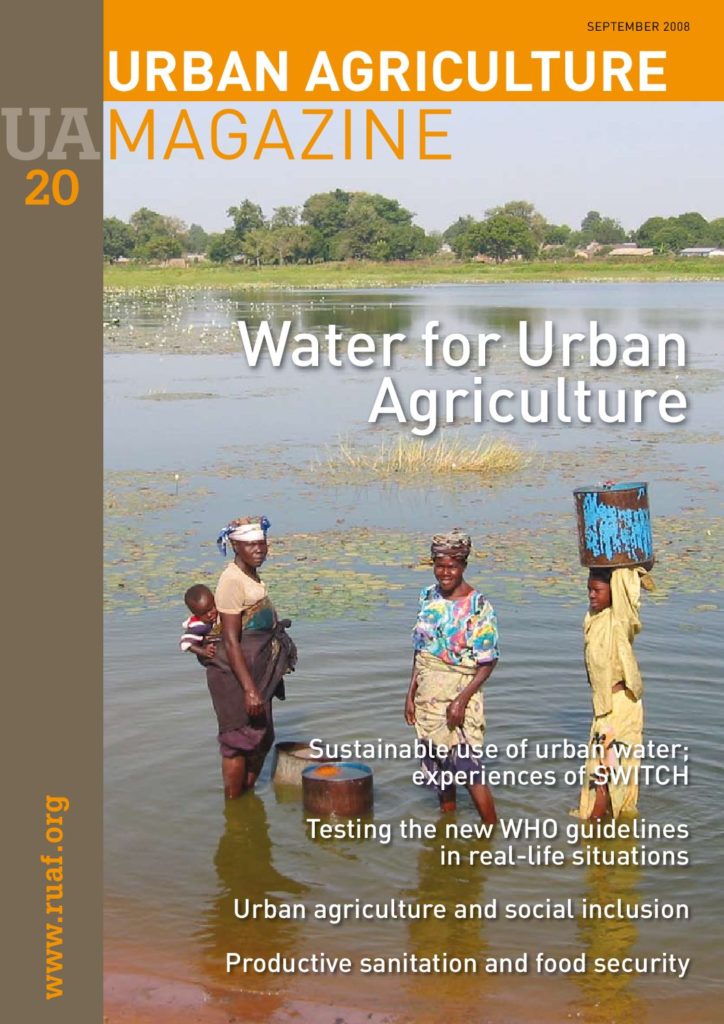In developing countries, many cities suffer from water scarcity because the water resources are not sufficient or are polluted, or because the capacity to treat and distribute the water is limited. As a greater proportion of economic activity is concentrated in space-confined urban areas, and competition for scare natural resources increases, the development of new (re)sources of water will be needed. Alternative water resources that could be put to productive use in the city are rainwater or stormwater and wastewater.
Although the proportion of people with access to sanitation services in urban areas is considerably greater than in rural areas, insufficient sanitation facilities in many countries has led to the degradation of the quality of water resources. Moreover, improved living standards and socio-economic conditions have led to the generation of waste and wastewater which are mostly discharged untreated into the environment. The volume (and value) of untreated human waste which flows directly into water courses and pollutes the environment is of concern.
Access to affordable water, good sanitation and food is essential. Achieving these goals will require integrated approaches and multi-stakeholder participation in the development of service provision and facilitation, and in the management of urban water.
In this issue of the Urban Agriculture Magazine, the importance of the water-sanitation-agriculture nexus is highlighted. Increasingly it is realised that urban agriculture may contribute to resolving urban problems related to water and waste/wastewater management. This issue is a collaborative effort of RUAF, SWITCH and SuSanA.
Also available in Spanish, Portuguese, French and Arabic.
Contents:
- Sustainable Use of Water in Urban Agriculture
- Using Treated Domestic Wastewater for Urban Agriculture and Green Areas; The case of Lima
- The Use of Reservoirs to Improve the Quality of Urban Irrigation Water
- Adapting to Water Scarcity: Improving water sources and use in urban agriculture in Beijing
- Technology and Institutional Innovation on Irrigated Urban Agriculture in Accra, Ghana
- Urban Agriculture and Social Inclusion
- Improving Decision-making on Interventions in the Urban Water Systems of Accra
- Testing the new 2006 WHO guidelines in real-life situations
- Surface Water Quality and Periurban Food Production in Kano, Nigeria
- Urban Farmers’ Irrigation Practices in Burkina Faso
- Farmers’ Perceptions of Benefits and Risks from Wastewater Irrigation in Accra, Ghana
- Use of Irrigation Water to Wash Vegetables Grown in Urban Farms in Kumasi, Ghana
- Water supply and urban agriculture in Bulawayo
- Efficient usage of water in South African Township Gardens
- Rainwater Harvesting Potential for Urban Agriculture in Hyderabad
- Water Supply and Urban Agriculture in Bulawayo
- Greywater Recycling for Food Production in Montreal, Canada
- Productive Sanitation: Increasing food security by reusing treated excreta and greywater in agriculture
- ECOSAN Fertilisers with Potential to Increase Yields in West Africa
- Reuse of Ecological Sanitation Products in Urban Agriculture : Experiences from the Philippines

